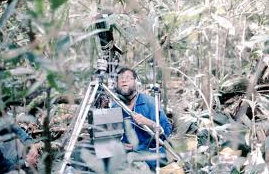The work of a humanist who documented Singapore’s transformation through film, photography, and an enduring curiosity for life.
Dr Ivan Polunin’s archives—a treasure trove of 35,000 film slides, 400 audio tapes, and 25 hours of film reels—tell the story of a Singapore that few remember and fewer still have seen. The late Dr Polunin, a British-born medical doctor turned ethnomusicologist, scientist, filmmaker, and photographer, captured the pulse of everyday life in Southeast Asia with meticulous care.
Arriving in Malaya in 1948 for his British National Service, Dr Polunin immersed himself in the culture, connecting with local communities and documenting their lives. His vivid colour photography and film, rare for its time, captured not only the physical landscapes of Singapore and the region but the lived experiences of its people, from the Orang Asli to bustling Chinatown markets.
His family recalls his tireless dedication to his craft. Often accompanied by his wife, Fam Siew Yin, who supported him in logistics and filming, Dr Polunin ventured into jungles, rivers, and villages, creating an unparalleled visual and auditory record of the region’s evolution.
Preserving a Legacy
Dr Polunin’s grandchildren, Kazymir and Asmara Rabier, now lead efforts to digitize and share his work. They are completing his unfinished manuscript, Once Upon an Island: Images of Singapore (1950–1980), which features over 1,000 photos documenting Singapore’s transition from pre- to post-independence.
Social media platforms like Instagram and Reddit have brought a new generation into contact with Dr Polunin’s work, sparking conversations about heritage, identity, and the fleeting nature of history.
A Visionary and Humanist
Dr Polunin’s use of colour film, his scientific approach to documentation, and his deep respect for people and nature remain at the heart of his enduring legacy. His archives are not just a collection of images—they are a vivid symphony of life in Singapore’s past, bridging generations and inspiring curiosity in the present.
As Dr Polunin once said, “Look at the things around you. They look ordinary now. But turn away for a minute, a day, a week, a year, and look at them again—they’ll be completely different.”








